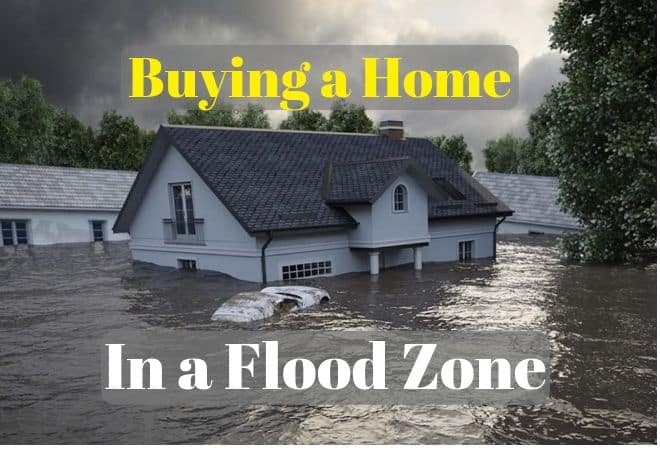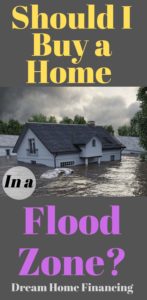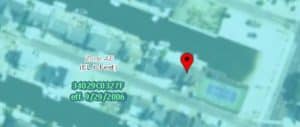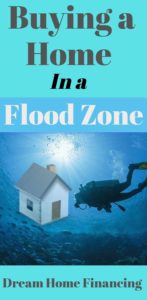Should I Buy a Home in a Flood Zone?

Some of the most beautiful places to live are located in a flood zone. It is not just the popular beach locations that are impacted. There are hundreds of rivers that have homes nearby which have the potential to be impacted by flood waters. In a recent study, it was estimated that 41 million people live in a flood zone.
Hurricane Katrina and Hurricane Sandy both left thousands of people homeless. Some areas still have not fully recovered. Many people lost everything because they did not have flood insurance. Even those with flood insurance dealt with insurance company and government nightmares leaving them no better off than those without insurance.
Should I Buy a Home in a Flood Zone?
If you are considering buying a home in a flood zone, find out if it is a high-risk flood zone, secure an elevation certificate, and get flood insurance quotes based upon the property location and its elevation. You should also be prepared to deal with the aftermath of a flood even if you are covered by flood insurance.
Click to get connected to a lender who can help you finance a home in a flood zone
6 Steps to Buying a Home in a Flood Zone
Follow these general and obvious steps before buying a home in a flood zone: 
- Ask your realtor for flood information regarding the home and the general area.
- Check the FEMA map to see is the home is in a high risk area and to check the elevation
- Ask to see the flood insurance policy from the current homeowner
- Get flood insurance quotes to understand the true costs moving forward
- Inspect the home for prior flood damage
- After purchasing the home, prepare yourself for the potential for a flood in the future
How Do I know if the Home is in a Flood Zone?
First, you can ask your realtor who should have extensive local knowledge about the flood areas in his or her market.
Next, and as an added measure, we suggest checking the FEMA Map to see whether the property address is located in one of the high-risk areas labeled as A, AE or V.
The photo below is a snippet taken from the official FEMA map. Yes, the map really is that blurry and it is also not kept up to date. You can see it says 2006. This property address is on the east coast and was directly impacted by Hurricane Sandy years later. The map still has not been updated. The listed elevation indicates 6 feet but it is likely less than that. The map also indicates this is flood zone AE.

This photo is an example of why you cannot even rely upon FEMA to provide you confidence that the home will not be flooded. As a result, you should consider carrying flood insurance even if FEMA lists the home in a low flood risk area.
Inspect the Home For Prior Flood Damage
If you are seriously considering the purchase of a home in a flood zone, you should have the home inspected by someone who can spot prior flood damage. You need to know whether the home has prior damage but also whether the repairs were done according to code. For example, if the home had water damage that impacted the electrical system, then the effected areas likely needed to be replaced.
How Much Does Flood Insurance Cost?
The first thing you need to understand is your traditional homeowner’s insurance policy will not protect you from flood waters. Flood insurance policies are independent of your homeowner’s policy and may also be difficult to find.
The flood insurance policy rates have also increased over the years as more storms have occurred and policy payouts have increased.
The average flood insurance policy will cost anywhere from $550 per year up to a few thousand per year. The rate will be based upon your location, whether it is in a high risk area, and the home’s elevation.
The insurance will likely cover up to $250,000 for the structure and then also an amount for personal property. Each policy will be different and this is something you can discuss with your insurance agent. You obviously would not need to pay for $250k worth of coverage for a home that costs half of that to rebuild.
We suggest asking the seller for a copy of their policy to see how they are covered and what their costs are. Then, shop for rates on your own. There is a chance that something has changed and your new policy could cost you more than what the current homeowner is paying.
Read this helpful article what buyers and sellers need to know about flood insurance.
Prepare Yourself for a Flood in the Future
The following information comes from the FEMA on how to prepare your home for a flood. These are measures that you can take to minimize the  impact, damage and costs related to a flood. This will not stop the flood from occurring.
impact, damage and costs related to a flood. This will not stop the flood from occurring.
- Elevate your AC unit, heating system hot water heater and electrical panel
- Waterproof the basement
- Install a sump pump in your basement with a battery backup
- Have sandbags ready to place at your exterior doorways
- If possible, elevate the building. This will be a significant expense. However, you may be able to eliminate your flood insurance if the home is lifted high enough. That will help offset the costs after a few years and it potentially could increase the value of your home.
What Should You Do If Your Home is Flooded?
If you already moved ahead and purchased the home and have flood damage, you immediately have to get focused on salvaging what you can from the home while also getting all of the insurance benefits that are owed to you.
The insurance company will send an adjuster to your home to determine the extent and the cost of the damage. In many instances, they use “third party” adjusters to perform this task leaving you the impression that they do not have a vested interest in the final cost. You can be sure that this process will result in a payment or settlement offer that is lower than what the true cost of repair or reconstruction will be.
It is a long and painstaking process, but you can fight the insurance companies to get more for your flood settlement. We had a home that was flood damaged and after challenging the flood insurance claim on virtually every line item on the report, we were able to double what they initially offered. You can do this too.
Can I get an FHA Loan for a Home in a Flood Zone?
You can get an FHA loan for a home in a flood zone as long as it is not located in any of the following areas:
- SFHA Zone A
- Zone V
- A Special Flood Zone Area
You would need to maintain flood insurance for as long as you have an FHA mortgage on the home. The coverage would need to be a minimum of the replacement cost of the home or for the remaining mortgage balance… whichever is less.
Read this informative article on FHA Rules for Homes in a Flood Zone.
Summary
If you fall in love with a home that is in a flood zone, you can still move ahead with the purchase if you are smart about doing your research. Understanding the costs and risks as well as preparing for the potential for a flood will be critical.
If you are looking for financing, we can help you to find a lender that is experienced in financing homes in flood impacted areas. Complete our contact form for a confidential discussion about your loan options.
Related Articles
Should I Buy a Home with Aluminum Wiring?
Should I Buy a Home with an Old Septic System?
What is the Best Mortgage Program for First Time Home Buyers?
Low Down Payment Mortgage Options
Discussion Topics
